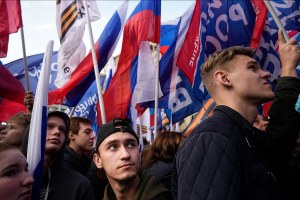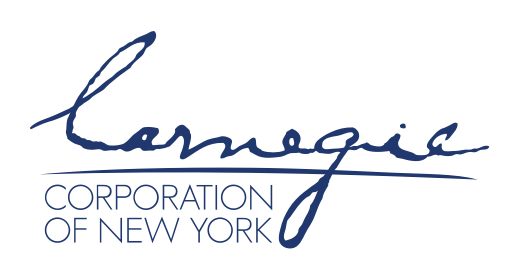Although a plurality of young Russians say they are anxious about Russia’s political future, few vote or participate politically.
Experiencing no leader other than President Vladimir Putin, Russians between the ages of 18–34 are described as being “raised on a diet of political indifference” and, at least at this point, seem unlikely to redirect Russia’s political future. A just-completed Chicago Council on Global Affairs-Levada Center survey of Russia’s youth population finds a generation that is largely positive about their own lives and career prospects but apathetic about participating in the political life of their country.
Key Findings
- Eight in 10 young Russians (82%) say they are very (65%) or somewhat (17%) proud to be Russian citizens, while few say they are not very (3%) or not at all proud (4%).
- A majority say their political views are the same (25%) or somewhat similar (32%) to those of their parents; a third say their political views are somewhat different (20%) or very different (13%) from their parents’ views.
- Just under half of Russian youths say democracy is preferable to any other kind of government (48%), while roughly equal amounts are amenable to authoritarian governments (20%) or do not think it matters for people like them (21%).
- Asked before this past weekend’s presidential vote, just 30 percent say they have voted in an election in the past two years, and even fewer say they have signed a petition (21%), filed a complaint (21%), participated in public hearings and committees (15%), or participated in a protest (2%).
- When thinking about their lives in 10 years, three in 10 young Russians say they feel optimistic and two in 10 say they feel excited.
- These positive attitudes may be attributed to their optimism about career prospects. Young Russians are more likely to say that career opportunities are increasing (47%) than decreasing (22%) or stagnant (24%).
Most Russian Young Adults Are Very Proud Citizens
The Putin Generation—as young adults in Russia are often labeled—is entering adulthood at a time in which Putin’s tenure is poised to rival the 31-year reign of Soviet leader Joseph Stalin. A February 2024 Levada Center survey found that the majority of young Russians view Putin favorably (84%). In addition, 68 percent of Russian young adults said they believed things were going in the right direction.
Data from the most recent Chicago Council-Levada Center survey also shows a generation with great pride in their nationality. Two-thirds of young Russians say they are very proud to be a Russian citizen (65%) and another 17 percent say they are slightly proud. Just 7 percent say they are not very or not at all proud, while one in 10 say they are indifferent toward their citizenship (11%).
Although the majority of Russian young adults are very proud of their nationality, they are more modest when it comes to the unique significance of the Russian people to world history. A little over half of young Russians say that they are a great people of particular significance to world history (52%), while slightly less than half say they are a people like any other (45%). This divide is similar to those noted in previous Council polling of young Americans, who tend to say that the United States is no greater than other countries.
Although a considerable share of Russia’s youth population thinks they are a uniquely significant people, this most recent reading is the lowest level ever recorded by the Levada Center. The Center first started posing this question to young Russians in 1999, at which point 57 percent affirmed their significance to world history.1 By 2017, the share of young adults that said Russians were a uniquely significant population rose to 64 percent but dropped by two percentage points in 2018. This survey—which used a different mode of interviewing than the previous face-to-face surveys—suggests that fewer Russian young adults are now convinced that they are a unique population (from 62% in 2018 to 52% in 2024) (see Appendix Table 1).
Young Russians Say They Share Similar Political Views with Parents
Data from previous Levada Center surveys show that young Russians are more likely to express confidence in Putin and national institutions, like the government, media, and local authorities than their parents and grandparents. Much of this confidence can be attributed to state efforts to reorient the educational system and instill a more patriotic ideology in students. These efforts include revising school history curricula to emphasize the positive aspects of the Soviet era and the Soviet role in World War II, with the ultimate intention of aligning classroom teachings with Kremlin thinking.
According to Levada Center adviser Lev Gudkov, a Russian sociologist who previously served as the Center’s director, such efforts by the state reinforce anti-Western ideals, a lack of political alternatives to Putin, and the collective sense that Russia is a great power among younger generations. In this way, he notes, the attitudes and perspectives of Russian young adults resemble those of older generations.
These polling results seem to back up that assertion, as most young Russians do not think their views diverge greatly from those of their parents. A majority of Russian youth say that their views are the same (25%) or similar (32%) to those of their parents. By contrast, just a third say they are somewhat (20%) or very different (13%).
Plurality Are Anxious about Future Political System
When asked to consider Russia’s political situation 10 years into the future, a plurality of young Russians say they feel anxious (32%) and another one in 10 feel pessimistic (9%). However, sizable percentages are optimistic (22%) or excited (14%).
The data show that those who are pessimistic about their country’s political future are more likely than others to support a democratic system of government. As a whole, nearly half of young Russians believe that democracy is preferable to any other form of government (48%)—more than twice as many of those who say an authoritarian government might be more preferable under certain circumstances (20%). An additional 20 percent say that it doesn’t matter for people like them if their government is a democratic or authoritarian system.
Those who are pessimistic (9%) or anxious (10%) about the future political state of the country are more likely to prefer a democratic regime (75% pessimistic, 60% anxious) than those who have a more positive political outlook (41% optimistic, 37% excited).
Relatively Few Young Russians Vote or Participate Politically
Most young Russians appear personally detached from politics. For example, few Russian young adults say they are interested in pursuing a career in politics or government (5%), and just slightly more are interested in state security or the military (7%).
Moreover, just 30 percent say they have voted in an election in the past two years, and even fewer say they have signed a petition (21%), united with neighbors to solve a common problem (19%), filed a complaint to solve a problem (21%), participated in public hearings, meetings, or committees (15%), or participated in a protest (2%) in the same time period2 .
Young Russians Have Mixed Economic Outlook
Young Russians, and particularly those between the ages of 18–24, tend to have a more optimistic economic outlook than the overall population. Levada researchers attribute this to a generational self-confidence and self-reliance, especially when compared to older generations, who rely heavily on state institutions for confidence.
According to the most recent Chicago Council-Levada Center survey, about four in 10 Russian young adults say they feel optimistic (25%) or excited (13%) when thinking about the Russian economy in the next 10 years, but the same proportion say they feel either anxious (32%) or pessimistic (10%).
When asked what potential careers they are most interested in pursuing, Russian young adults most often choose some form of economic activity, including business, finance, entrepreneurship, or retail (25%). Others select professions related to business, like information technology (8%), manufacturing (7%), engineering (6%), and construction (6%) (see Appendix Table 2). By contrast, few from this generation of Russians are interested in government-related fields, like politics and government (5%) or the army (7%).
This data reflects the current state of economic affairs in Russia. According to Grant Thornton, the fastest-growing sectors of the Russian economy are energy and fuels, information technology, pharmaceuticals, and agriculture. Since 2011, two-thirds of the Russian workforce has worked in the private sector.
When asked about career opportunities in Russia today compared to five years ago, young Russians are more likely to say they are increasing (47%) than decreasing (22%) or stagnant (24%).
Russian Youth Positive about Their Own Lives in 10 Years
Russian young adults have more favorable views toward their future lives than they do toward Russia’s economic and political future, likely because they have more agency over their life paths than they do over the latter. A plurality says that when thinking about their lives in 10 years, they feel optimistic (34%), and another two in 10 say they are excited (20%). About three in 10 combined say they are either anxious (22%) or pessimistic (6%).
Reflecting this optimism, relatively few young Russians say they have ever thought about emigrating to another country (30%). That share is lower now than that recorded in previous polls, including a 2019 Levada Center survey that found 53 percent of young Russians wanted to emigrate. The percentage of those thinking about emigrating may be much lower today because many young Russians have already left, especially in the aftermath of Russia’s February 2022 incursion into Ukraine. But now, some may not even consider the idea of emigration because the process of obtaining a visa or international residency is expensive and complex.
Among those who say they have thought about emigrating, most cite the political situation in Russia (42%), an unstable economic situation inside the country (40%), and higher standards of living abroad (39%) as reasons why. Fewer say it is because of better business conditions abroad (17%) or to avoid military conscription (16%).
Conclusion
In the last couple of years, surveys by the Levada Center have shown that young Russians were more supportive of opposition figures and less supportive of the Russian military action in Ukraine than older Russians. However, the most recent Chicago Council-Levada Center survey shows that young people do not perceive a great deal of daylight between their own political views and those of their parents, and are just as likely to express nationalistic feelings of pride.
Russian institutions such as the workplace, schools, and the army tend to reinforce the notion that Russia is a great power and that there are no political alternatives to the current regime. In addition, the Kremlin seems to have succeeded in numbing this generation toward politics by suppressing and discrediting critics of the regime, stifling independent media, and feeding its citizens a steady diet of state media. While this might create an apolitical generation for years to come, it also seems to leave the Putin Generation fairly upbeat about their personal futures.
- 1Between 1999-2018, the Levada Center posed this question to survey responds via a face-to-face interview method. By contrast, the most recent survey used a computer assisted telephone (mobile phone) interview method; as a result of the different methodologies, the responses are not directly comparable but may suggest an important to shift.
- 2The last parliamentary election was held in September 2021, almost three years ago. Since then, there have only been regional elections that typically draw a lower voter turnout, so it may not be unusual that only 30 percent of respondents say they have voted in an election in the past two years.
This Chicago Council on Global Affairs-Levada Center survey was conducted between February 6–26, 2024 among a weighted national sample of 1,003 adults between the ages of 18–34 living in Russia. This sample was obtained from a randomly generated sample of mobile phone numbers, which were used to contact respondents and survey them via a computer-assisted telephone interviewing method. The margin of error for the full sample is ± 3.1 percentage points at a 95% confidence interval.
The eligibility of respondents was verified based on their answers to questions about age and their region of residence. For the study, respondents residing within the territory of Russia between the ages of 18–34 years old were considered eligible to be surveyed.
This work is made possible by the generous support of the Carnegie Corporation of New York.








Related Content
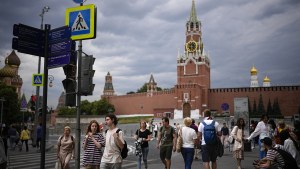 Public Opinion
Public Opinion
Russians report limited impact of Western-imposed sanctions and continued support for the war in Ukraine.
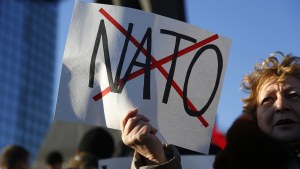 Public Opinion
Public Opinion
The Russian public is concerned about NATO expansion but does not think an attack from the West is imminent.
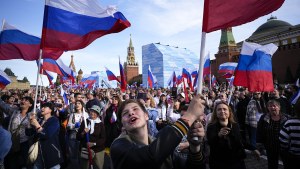 Public Opinion
Public Opinion
While many Russians favor negotiating for peace with Kyiv, they are unwilling to give up any Ukrainian territory seized since 2014. They are, however, more open to a “neutral” status for eastern Ukraine.
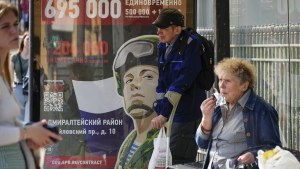 Public Opinion
Public Opinion
While a majority continue to express support for the war and more now sense the military operation has been successful, the Russian public is divided on whether it has led to more positive or negative consequences.
